Activities
ART
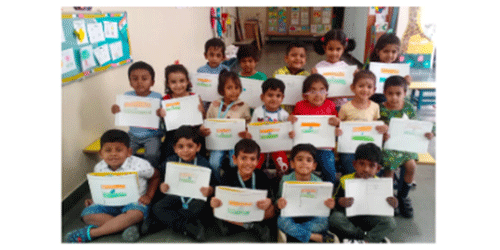
Pablo Picasso has said..."Every child is an artist."
Research confirms that Art education strengthens student problem-solving and critical thinking skills, adding to overall academic achievement, school success and preparation for the work world.
Art classes provide students a chance to develop cognitive and creative skills, and to develop their imaginations.
For some students Art is their motivation for coming to school and an area where they have success or excel, or create a world they always wanted. This provides an important balance in their total educational experience.
As we know Lines are basic to all of the visual arts. Drawing is more or less based on using lines so in KKA we start our art class with the basic strokes and lines.
ART
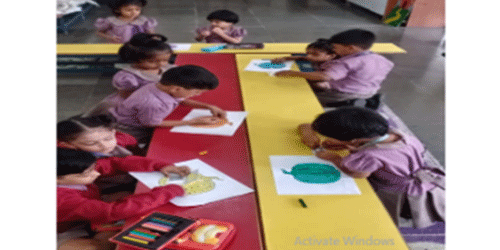
In Pre KG, the child is exposed to scribbling, colouring and different types of strokes or lines. They are taught the correct way to hold the crayons and colour the picture with strokes in one direction and without leaving white spaces in between. The little fingers are trained to colour within the border.
We stress upon and encourage every child not to use any sort of rulers to draw these lines. The not so perfect lines do get better every day with practice.
In LKG, we start with those simple strokes of pre kg (a quick brush up) to boost up their confidence... "I CAN DRAW". They learn simple drawings with the simple lines or curves. Again we remind them to draw freehand without using Technical drawing tools.
Colouring is the part which most of the children like. We stress on the precision by telling them to follow some guidelines. Drawing the border first with the colour you want to fill the object with (and not with Black colour making the drawing look more realistic. Colouring to be done with same small strokes (preferably left to right). White space should be avoided in between the coloured strokes.
UKG classes start with the same strokes but like patterns. Here as the child is more confident and matured than the last year we start off with full compositions. Composition is the placement or arrangement of visual elements or ingredients in a work of art. In his class they get an idea to deal with the positive and the negative space. With time, they slowly get to know the other rules of compositions.
Little hands are now steadier to colour small places. Their strokes become more controlled. They slowly become confident to draw anything. Sometimes instructions are given to fill in with particular colours and sometimes they are given freedom to use colours of their choice.
Physical Education
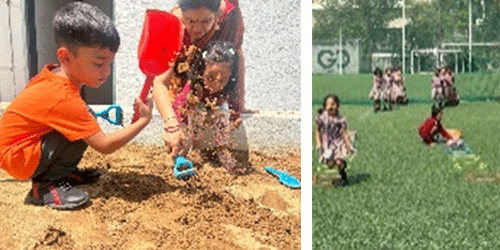
Through play children explore, invent and create. Sports and physical education is fundamental to the early development of children and the skills learnt during play, physical education and sports contribute to the holistic development in them. Free play, organized games and sports events promote a spirit of sportsmanship, co-operation, patience, self-restrain and leadership in children. A channelized outlet for the reservoir of energy which the children possess is the objective of physical education.
Fun Yoga
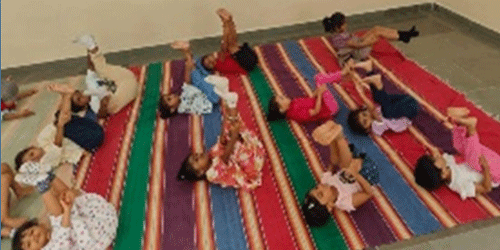
Yoga, derived from a Sanskrit word 'Yuj', is a physical, mental and spiritual practice that aims to transform the body and the mind. Introducing your children to yoga at an early age can help them learn healthy lifestyle habits and set the foundation for a fit future. Yoga is a great way to develop flexibility and strength in children.
At KKA, kids explore and learn yoga in a fun, safe and playful way. It teaches them about their bodies, on how to breathe better, how to use their energy more effectively, how to calm their mind, how to balance and so on.
Field Trips
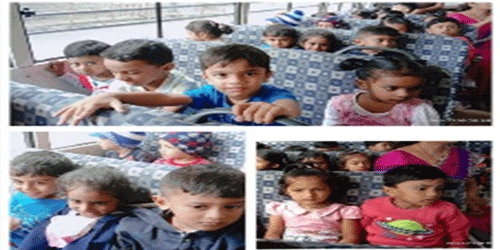
Memories of school Field trips are among the most prominent of the formative years, largely because they are a welcome break in the routine for both students and teachers. While their purpose is essentially to educate, they can also be a fun bonding experience for everyone involved.
Taking students into a new environment gives them the experience of traveling in a group and teaches them to be respectful of the locations they visit.
Festival Celebrations
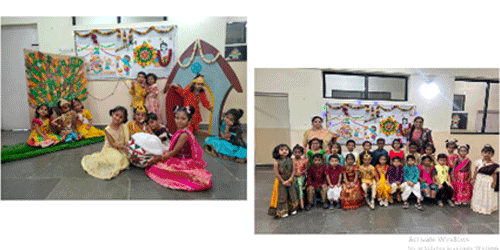
Festivals create a sense of national and cultural unity, brotherhood and belonging. Importance of festivals is explained to children through pictures, audio visual and displays. Independence Day , Teachers Day, Children's Day are some of the important celebrations at school.
Shloka Recitation
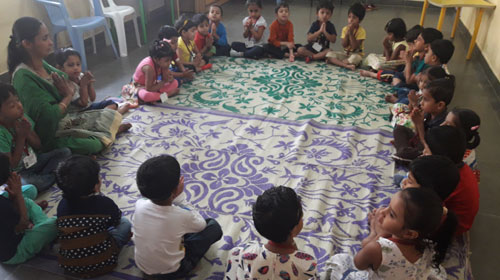
The word shloka means 'song', and originates from the root sru or 'hear'. A shloka is generally a couplet of Sanskrit verse, especially one in which each line contains sixteen syllables. Shlokas when chanted makes the practitioner gain peace, feel calm, become more centered, energize the brain and develop clarity of speech. Chanting, being a part of their daily ritual at school keeps their body, mind and soul healthy.
DEAR (Drop everything and read)
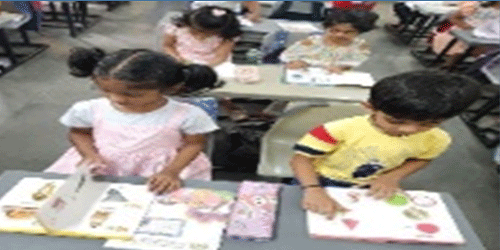
Reading is important because it develops the mind. The mind is a muscle. It needs exercise. Understanding the written word is one way the mind grows in its ability. Teaching young children to read helps them develop their language skills. Reading helps children focus. DEAR is an activity where children drop everything they are doing and indulge themselves in reading a book they love.
Library
Readers make Leaders. The art of sitting quietly in a library and reading is instilled in children from a young age
Related Links
Get in Touch
Reach out to us. We would love to hear from you
Contact Us